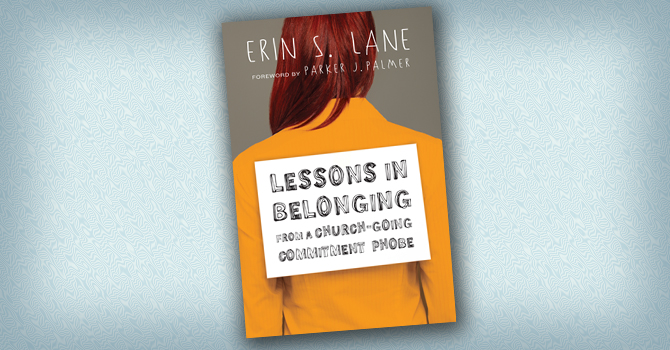Editor’s note: In “Lessons in Belonging from a Church-Going Commitment Phobe,” Erin S. Lane writes about the importance of belonging and community, especially for church-avoidant millennials. In this excerpt, she goes to church with her mother, Perk, and finds an unexpected lesson on belonging in the story of Jesus’ post-resurrection appearance on the road to Emmaus.
It’s Easter Sunday, and I make Perk get to Outpost twenty minutes early. This is the Catholic in me, the one who used to get dropped off in front of the sanctuary to “go grab seats” only to find herself and her family relegated to the fellowship hall where the misfits and latecomers were punished by the cold, hard bottoms of folding chairs. At this Presbyterian congregation we have our pick of the pews.
Perk wants to sit on the side, near the back, and so she shimmies down a row and drops her purse on the floor. I slide in beside her. Minutes later, she is rummaging through her belongings, pulling out wandering coins and foil wrappers. “Excuse me, honey bun,” she says and stands to exit.
“Bathroom again?” I ask.
“No. I want to take a picture of the altar. It’s so pretty.”
“Mom, no one takes pictures in church.”
“Oh, Erin,” she says and pushes past my legs into the aisle.
I watch her approach the front of the sanctuary. There’s a wooden table with a water jug on it. She takes a few pictures from different angles, even walks around the pulpit and kneels for a better shot at one point. The whole scene looks rather plain to me. She must see something I don’t.
Our associate pastor Rob is giving the sermon today. He preaches on Jesus’ postresurrection walk to Emmaus. The story begins as two followers of Jesus start out on a journey of seven miles. At some point, we don’t exactly know when, Jesus joins them -- or “came near” ( Luke 24:15). They are deep in discussion, probably playing and replaying the events of the past few days -- betrayal, death and a missing body -- like it’s something out of one of those crime dramas Perk watches. When Jesus comes near, they are trying to make sense of what is real and what is spiritual smoke.
He appears a stranger to them at first. They fill him in on the drama, how they had hoped Jesus of Nazareth was the Savior, the one Israel had been waiting for, but now it has been three whole days and there’s been nothing more than reports from some fanatical women about an empty tomb. Jesus can stand their nonsense no more. He calls them slow of heart -- slow of heart to believe the new reality. That he has risen. That they are saved. That it is finished.
But this isn’t my favorite part of the story. Not even close.
When the disciples reach their destination, they turn off the road, maybe even with an awkward, “Well, this is us,” unsure if Jesus will continue on with them -- wants to continue on with them -- or has better things to do. And Jesus, Rob points out, instead of following them, instead of continuing to convince them with his divine interpretation of events, “walked ahead as if he were going on” ( Luke 24:28). Did you get that? Jesus pretends to keep going, ahead, onward, by himself. But why? Some scholars say he does it to give the disciples an opportunity to practice hospitality, but I think it’s something more basic. I think it’s about longing.
In offering himself as bread for the world, Jesus ran the risk of being rejected, and he was by many who wanted no part in his part. There’s no guarantee our offerings to the world will be received any better. There’s nothing to say someone will accept our gifts, handle them with care or help them come alive. But it’s our choice to offer them. It’s in the offering that we accept belonging for ourselves.
The disciples don’t want their time with Jesus to end. So they urge him to come with them. They invite him to their table. “Stay with us,” they say. One wonders if this was what Jesus was hoping for all along. Was it his ploy to continue on in holy passive aggressiveness, whereby Jesus, like a beleaguered spouse, thought, “I know what I want you to do, but I want you to do it without my asking”? Or is it possible the Savior of the universe is longing to belong to us?
Before there were dollars and cents and twenty-something artisans peddling their wares on the website Etsy, the gift economy was the central means by which communities achieved peace both within and between neighboring tribes. A gift rightly offered and fittingly exchanged could prevent not just internal turmoil but war between tribes. In his essay “The Spirit of the Gift,” twentieth-century anthropologist Marshall Sahlins reflects on how all gifts bear the goal of reconciliation. He quotes a Bushman as having said: “We give what we have. That is the way we live together.”
We give what we have. This is also the way we worship together. In the economy of the local church, we are reconciled to one another by need, both our need to receive the gifts of one another, but so too the need to feel like we have something of worth to give. It isn’t enough to just speak our need. We need to feel needed in return.
The more I’ve thought about it, the more I believe belonging is a two-way street, not a tit-for-tat contract that asks what we each get out of this but a covenantal relationship by which promises are made and gifts are exchanged. So in addition to asking, Do I really need the church? we should also be asking, Does the church really need me? or How is it that we belong by our longing for each other?
I find it strange that membership in many churches across America has more to do with an individual’s commitment to the worshiping community rather than the other way around. If there are promises made by the congregation, they are often universal and abstract, having little to do with the gifts and personalities of the ones they are being promised to. Perhaps this is my “everybody deserves a medal” millennialism speaking, but I want it to matter that I, Erin Lane, grade-A awkward at belonging, introverted, critical and sensitive human being, am joining this local body of believers. I need to believe that I am not just another sack of bones in this congregation, just another number to report to the denomination’s judicatory board, just another person to “plug in” somewhere so that this church can survive. God may choose to include Jew and Gentile alike in the new covenant of bread and cup, but God also chooses each one of us by name.
If I am to join a church, any church, maybe even your church, I need to believe that you want me to belong. This me. The me that I will be in a week. The me that is always arriving. And when this me pretends to walk away, go on ahead, forge the path by herself, I need you to say the following words with some sense of urgency:
“Stay with us.”
And I will try.
Taken from “Lessons in Belonging from a Church-Going Commitment Phobe” by Erin S. Lane. Copyright (2015) by Erin S. Lane. Used by permission of InterVarsity Press, P.O. Box 1400, Downers Grove, IL 60515-1426. www.ivpress.com



















